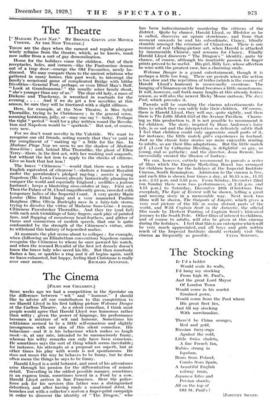The Theatre
111maaam Prays NAY." BY BRENDA GIRVIN AND MONICA COSENS. AT THE NEW THEATRE.] THESE are the days when the earnest and regular playgoer 'wisely refrains from the theatre, which, as he knows, must now suffer from a sort of gay demoralization.
Home for the holidays come the children. Out of their receptacles, holes, and corners—like the Pantomime demon out of a trap door—emerge the Old Favourites, newly be- dizened. We may compare them to the ancient relations who gathered in many homes, this past week, to interrupt the family's occasional game of complicated Bridge with blithe frivolities—General Post, perhaps, or even Blind Man's Buff. "Look at Grandmamma! ' the usually sober family shout, "she's younger than any of us." The dear old lady, a mass of Dickens and Thackeray, is wreathed in rosebuds for the evening . . . . And if we do get a few novelties at this season, be sure they will be tinctured with a slight silliness.
Here, for example, at the New Theatre, is Miss Sybil Thorndike, trying to be Christmassy ; in the general sense, meaning boisterous, jolly, or—may one say ?—larky. Perhaps the right " period 's word for a play written round the Revolu- tion and Napoleon would be " sparkish." But not, of course, very new.
For we don't want novelty in the Yuletide. We want to recognize our old friends, noting merely that they've paid us the compliment of " making up " a little for the fun. In Madame Plays Nap we seem to see the shadow of Madame Sans-Gene ; and, behind Miss Thorndike, the ghost of Ellen Terry—there, in the first act, with her washing and soapsuds, but without the hot iron to apply to the cheeks of citizens. Give us back that hot iron !
The brave " Citizeness "—would that there was a better English equivalent of citoyenne !—shelters a hunted Royalist under the pawnbroker's pledged rag-bag ; assists a young Napoleon (Mr. Lewis Casson) already fantastically planning to conquer the world and especially England ; mollifies a jealous husband ; keeps a blustering sans-culottes at bay. First act. Then the Palace of St. Cloud magnificently green, crowded with temporary ladies of the Imperial Court. A very pretty Marie Louise (Miss Ethel Inga) and a very mannered Pauline Borghese (Miss Olivia Burleigh) rave in a fairy-tale storm, trying to dissolve the virtue of Madame Sans-Gene—I mean, Citizeness Pawnbroker Thorndike. And they try (and fail) with such arch twinklings of fairy fingers, such play of painted fans, and flapping of monstrous head-feathers, and glitter of tiaras and mannerism of modish speech, that one is quite confounded by the strength of the Citizeness's virtue, able to withstand this battery of bejewelled malice.
At moments the plot seems about to collapse ; for example, when (following an Elizabethan convention) Napoleon cannot recognize the Citizeness to whom he once pawned his watch, and when the rescued Royalist of the first act densely doesn't know the brave lady who saved his life. But then somebody flashes a fan, or sparkles a ring and it all begins again, until we leave exhausted, but happy, feeling that Christmas is really
































 Previous page
Previous page